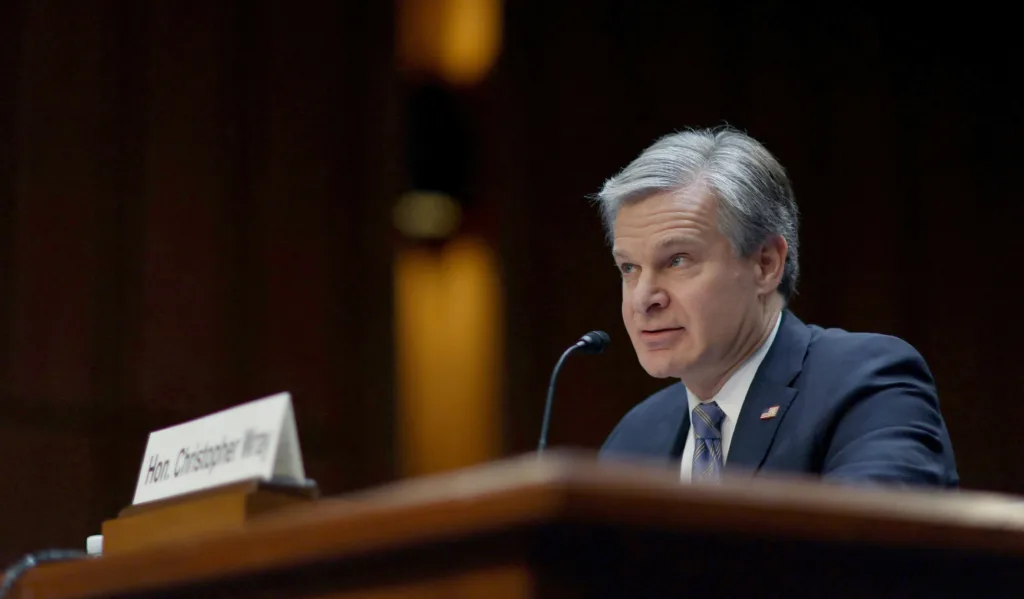
by Kate Scanlon
WASHINGTON (OSV News) — FBI Director Christopher Wray sparred with Republicans during testimony before the Senate Judiciary Committee Dec. 5 about a leaked and withdrawn memo from the bureau’s Richmond, Virginia, field office about political extremism in some Catholic groups.
During a committee oversight hearing, Sens. Mike Lee, R-Utah, Ted Cruz, R-Texas, and Josh Hawley, R-Mo., had tense exchanges with Wray about the memo, alleging the bureau targeted Catholics. Wray denied that allegation, arguing they “do not and will not conduct investigations based on anybody’s exercise of their constitutionally protected religious expression.”
Hawley asked Wray if Catholic churches are “breeding grounds for domestic terrorism,” and if there is “systemic bigotry against Catholics in the FBI?”
Wray rejected both claims.
The FBI faced scrutiny earlier in 2023 after a leaked memo suggested some “radical traditionalist” Catholics pose threats of racially or ethnically motivated violence. The memo was later retracted by the bureau, a spokesperson told OSV News at the time.
In the leaked memo dated Jan. 23, an analyst at the FBI’s Richmond Division said “Radical Traditionalist Catholics” are “typically characterized by the rejection of the Second Vatican Council.” The memo said the ideology can amount to an “adherence to anti-Semitic, anti-immigrant, anti-LGBTQ and white supremacist ideology.” The memo also named far-right personality Nick Fuentes, who publicly self-identifies as Catholic, engages in antisemitic and racist rhetoric, and is identified in the memo as having ties to “white Christian nationalism.”
However, the memo distinguished “radical traditionalist” Catholics as “separate and distinct” from “traditionalist Catholics,” Catholics who “simply prefer the Traditional Latin Mass and pre-Vatican II teachings.” The same FBI memo noted that “conversely, deep-seated anti-Catholicism remains a characteristic of many far-right white nationalists.”
Some of the groups named in the memo are not canonically recognized by the Catholic Church, including the Slaves of the Immaculate Heart of Mary located in Richmond, New Hampshire.
Republicans on the House Judiciary Committee alleged Dec. 4 that the FBI interviewed a priest and choir director affiliated with a Catholic community shepherded by the Society of St. Pius X in Richmond, Virginia, for the memorandum. The SSPX is a traditionalist religious order dedicated to providing the liturgical form of the Roman Rite prior to Vatican II; however, it does not have official canonical recognition by the Catholic Church, and (while not in schism) exists in an irregular state of communion with respect to the pope.
Wray, who was nominated to lead the FBI by then-President Donald Trump in 2017 and later kept in the role by President Joe Biden, has previously condemned the memo in testimony before Congress, and repeated in the Dec. 5 Senate Judiciary Committee hearing that he was “aghast” at its contents.
The scrutiny of the FBI memo coincides with wider complaints by some Republicans about the “weaponization” of the federal government, sometimes citing other incidents, including criminal charges against Trump. The former president faces charges of mishandling classified materials and illegal conduct in his efforts to overturn his 2020 election loss to President Joe Biden, among other charges.
Sen. Dick Durbin, D-Ill., chair of the committee, objected to those claims in his opening remarks.
“I’m troubled that the FBI is facing baseless claims that you have been weaponized for political purposes and dangerous calls to defund the agency,” Durbin told Wray.
Elsewhere in the hearing, Sen. Laphonza Butler, D-Calif., the former president of the abortion advocacy group EMILY’s List, asked Wray about threats against abortion clinics since the 2022 Dobbs v. Jackson Women’s Health Organization ruling that overturned court precedents establishing abortion as a constitutional right.
Wray replied that “actually we’ve seen a huge uptick in violence against pro-life facilities, not just abortion clinics and so forth.”
“We’ve seen violence on both sides of the issue,” Wray said. “And the reason I bring that up is because it’s important for Americans to understand that I don’t care, we don’t care, what side of the abortion issue you’re on — you don’t get to engage in violence to express your views. That’s where that’s where we (the FBI) get involved and that’s where the line gets crossed.”
Wray also asked lawmakers to renew a surveillance law he argued is a key aid to U.S. intelligence efforts. Section 702 of the Foreign Intelligence Surveillance Act, or FISA, expires Dec. 31. The law grants the U.S. government some ability to review certain digital communications of people outside the country. Some Republicans have alleged it has been weaponized against conservatives. Wray argued that steps to ensure the bureau’s compliance with the parameters of the law have been implemented.
Wray argued the law is “key to our ability to detect a foreign terrorist organization overseas directing an operative here to carry out an attack in our own backyard.”
“Given the critical importance of 702, we’re committed to being good stewards of our authorities,” he said. “To that end, I’ve ordered a whole host of changes to address unacceptable compliance incidents.”






